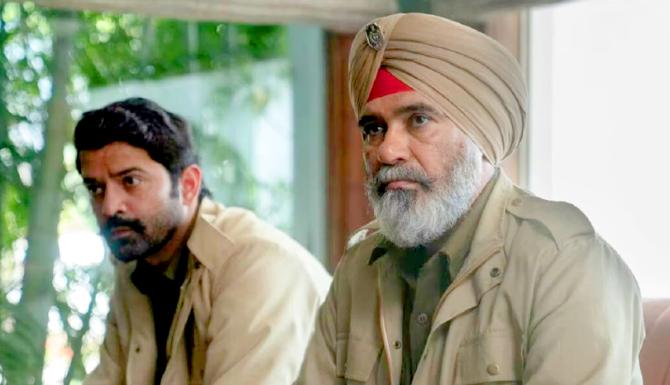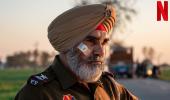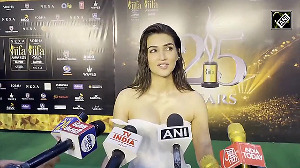'As long as violence has the right arc, it is very meaningful.'

After romancing pretty women on television and winning many, many, hearts nation-wide, Barun Sobti is almost unrecognisable in his new avatar, and he is loving every bit of it.
As Barun makes waves in the Netflix series Kohraa, he tells Ronjita Kulkarni/Rediff.com, "Very few actors in our country have range. I just wanted to put my range on display."
What was your state of mind when you were doing an intense Web series like Kohrra?
Oh, I had a ball doing it!
I was given a lot of liberty to bring to the fore this layered human being, who's a cop and who should be seen as a human being. Usually, cops are seen only as cops. A majority of defence characters are (played as) unidimensional heroes.
You know, punch one person and a 100 people fly!
But here, the idea was to make it as real as possible.
I didn't want to repeat one single cinematic moment.
Basically, the thing is that actors, after a point of time, try to replicate the hit formula. They try to act the moment they have seen on screen.
I didn't want to do that. I wanted to draw from real life.
I was realistic, so I thought it could go either south or very well.
Thankfully, when I started understanding the nuances and the script, and everyone started appreciating my work, I felt I was going in the right direction.
But Kohraa has really taken off and people are talking about it so passionately.
Conversations with people used to be different.
Initially, they would be like, can I take a picture with you and stuff.
Now, that has changed.
Now, people want to talk about it. They are very passionate about it.

Kohrra has a lot violence, and your character does a lot of it. Did it ever make you uneasy?
Yes, it did.
But violence is a piece of art. It has to be done right. As long as violence has the right arc, it is very meaningful.
But there are a lot of torture scenes done by your character.
Yes. But that's the truth for cops.
It's not something that has been fabricated. It's not one of those flashy pieces of work, you know, choreographed correctly.
Cops do go wrong.
Cops are not calculated computers; that's why we don't get the right convicts all the time.
And the torture that you are talking about, in the last episode, there's a submission. When you watch it, you will understand.

How tough was it while you were doing those scenes?
It gets a bit much to be honest, especially when you're doing this real kind of stuff.
It's physically exhausting.
But everyone's in it together, right?
It goes a very, very long way if your co-actor comes in and shares the same vision as you do.
This happened in all the violence scenes.
Everyone was so kind and they were like, Paaji, just go for it, don't think about it.
But yes, it was a little bit much.
When you do an intense show like this, and play dark characters, do you take it home with you?
No, I don't.
When I was 19-20, I used to work in a call centre.
Right from that time, I had told myself that whatever kind of work I do, I'm never bringing it back home.
I don't do that with my personal life and I'm not going to do that with my work.

You are a Punjabi, but you haven't lived in Punjab. How much of the character could you relate with?
The relation has to come, otherwise it's not going to happen.
For the magic to happen, the relation has to come, the respect has to come...
I will not judge my character. Otherwise, I will not be able to perform it.
Initially, when I read the whole thing, the first thought that came to my mind was that this guy can easily be disliked.
The second thing that came to my mind was don't judge this guy, you have to perform this guy. Let's go in and understand what is happening.
Then there were a few things that I brought in.
I thought it has to be played with affability. This guy has to be affable otherwise it's going to go down south.
We spoke a lot about where he comes from, what happens... very little of it is shown, but we had long discussions on those tiny single shots as well.

What's your favourite scene?
Let's talk about the violence.
When (Barun's character) Garundi enters Sakaar's prison cell, Sakaar gets really scared. Garundi tells him that 'Tere papers aa gaye, tu jaa sakta hai.'
Bahut pyaar se kehta hai because he realises he's made a grave mistake.
But this guy doesn't move.
He's really scared because of obviously, all the torture that has happened.
So Garundi sits down, puts a hand on his shoulder, which Sakaar shirks off, and then Garundi says in a very light voice, 'Sorry, yaar.'
And this guy starts crying.
That is my favourite scene.
You have quite a few OTT releases in the last two years, and doing diverse roles, reaching to wider audiences. Are you finally living your dream?
I would call myself mildly successful now.
It's exactly in the place I've always wanted to be.
I had the foresight to look at things in the long run.
What's happening today is exactly how I thought things should happen.
At the same time, I did get extremely lucky with some tremendous options.
So I'm exactly in the place that I want to be.
I might not be very successful but extremely happy with the work I'm doing.

So what changed? What changed your career?
I don't know, yaar. I really don't know what happened.
Luck.
At the same time, everyone started thinking about me.
Asur happened.
All the milestone things that I've done, I really couldn't believe that these people want to cast me.
First of all, I was very lucky to be cast in a very small film called Halahal.
People tend to stereotypical, but Randeep Jha (Kohrra Director) cast me in a role that no one could ever imagine me.
Sudip (Sharma, co-creator) saw Halahal and cast me in Kohraa.
Your look has changed a lot, from the romantic hero to a very intense guy. There's absolutely no similarity between then and now. Was that on purpose?
That was, again, the design of luck.
Very few actors in our country have range.
I just wanted to put my range on display.
Let everyone know that chupe hua hai kahi log.
There are fabulous actors in our country who are not getting their due because people only want to go with names that will sell.
The great thing was that everywhere I went, everyone shared my vision too.

You were a popular TV star, especially in the show, Iss Pyaar Ko Kya Naam Doon. Did you enjoy TV in the beginning or was it just a way to earn good money?
It was a pretty organic graph.
I didn't have any connections in the industry.
When I came in, my agenda was to get financially stable because I had to get married at that time. I couldn't take that risk that chalo, I will only audition for films.
The first option I got was in television.
And when you start doing television, you will get called from television only, even for auditions.
When did you decide that you wanted to move away and do more?
Iss Pyaar Ko Kya Naam Do ran for one year and nine months.
We shot for two years.
At that time, I discovered that I am ADHD. I cannot hold my attention span for long.
So I figured that I can't keep doing the same thing for the longest time.
I didn't enjoy it that much, to be honest with you, because do-saal tak you are just closed in a set -- so it's set to home, home to set.
There's no enjoying popularity, you don't get an opportunity.
It was only when it was over that I realised how big I was, how big the show became.
How tough was the decision to move away from television?
It was so daunting! I'm really impressed with my former self for talking that decision.
A big reason for being able to execute this decision is my wife.
We have to have that understanding with your partner.
If it wouldn't have worked out, everyone would have said it's a juvenile decision. But we did go through our hardships.

Your films didn't do well.
When any of your work doesn't work, it's disappointing. I was not trained for that Friday to Friday wala thing.
I'm very unsocial and unworldly, and I don't run after money.
Aisa nahin tha ki, yaar, khatam ho gaya zindagi.
I was like, I've still got what I've got and I'll wait for the right things.
Thankfully, at that time the digital revolution was happening in the US, so I got to watch a lot of great content and hone my skill.
And then that exact same revolution came to India.
I was just hoping that I get to ride this wave, and that's what happened.
How did a boy from Delhi become an actor in Bombay?
I didn't spend a lot of time thinking that I want to be an actor.
Everyone thinks in passing na, that I want to be an actor.
By chance, it shaped up like that.
There's a friend of mine, Karan Wahi, with whom I had shared my desire to act.
He was getting a show, but was charging a lot more money.
So he was told by the producer ki bring us a cheaper version of you.
So he called me and asked me to audition, and they seemed to like me.
So I came here.
Then, there's no other option but to succeed.

You got married in 2010 to your best friend from school. Can you tell us more?
We met in school, and were just friends initially.
Around Standard 11-12, we started going out, and I expressed my desire to her.
I started working in Delhi, but was not financially stable.
She went to Australia to do her master's and worked there for a bit.
Meanwhile, I was trying to find work here.
When I was doing a show called Baat Hamari Pakki, she came back and we got married. Now, we have two children.












 © 2025
© 2025